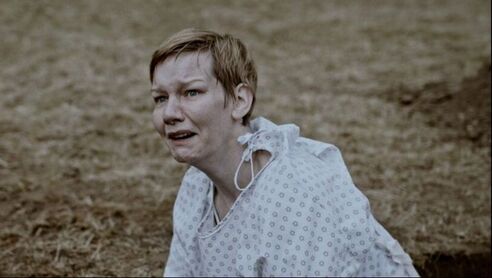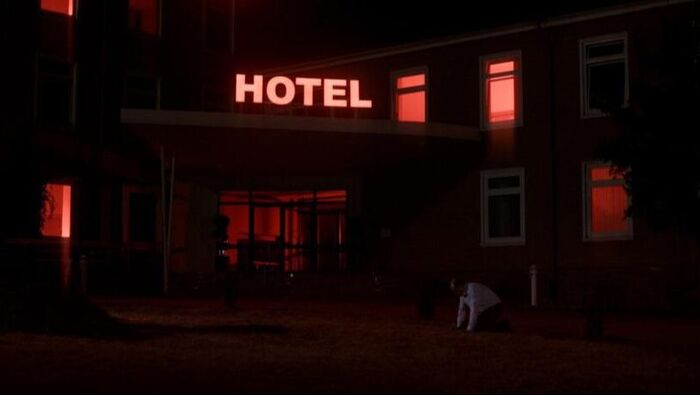 There are events that are so horrible, crimes so heinous, and conspiracies so vast that they send shockwaves through an entire country and across time... ...They fundamentally alter the national consciousness for generations and shape the definition of terror throughout a nation. For Americans, one such event is the genocide of the Native Peoples. Another is the institution of slavery. Still another is the use of nuclear weapons on two civilian locations. The consequences of the latter still haunt Japanese culture; the destruction of Hiroshima and Nagasaki continues to cast a formative shadow in Japanese fiction. And for the Germans, the great unshakable terror of their consciousness is the rise of Nazi-ism and the Jewish Holocaust. Making its North American premiere at Fantasia 2020, the German film Sleep (or in German, Schlaf) is as effective and intelligent a film on this subject as I’ve seen since The Shining. The first film from director and co-writer Michael Venus (written with Thomas Friedrich) is as frightening as it is beautiful. Larger, more eye-grabbing scares are few and far between, but every minute of Sleep is infused with a deep running sense of dread. Sumptuously shot scenes draw you in with their beauty and composition while showing something horrible lies just beneath the surface. Sleep takes place primarily in the cozy and remote village of Steinbach. An outsider finds herself driven to Steinbach’s local hotel by a series of nightmares that cause sleep paralysis. The outsider checks into a room at the hotel and almost immediately suffers a nervous breakdown accompanied by visions of a great, hairy boar. The woman is admitted to the nearest hospital and her daughter, Mona (Gro Swantje Kohlof), is notified of her mother’s breakdown. Mona learns her mother is in a catatonic state and goes to the hotel to see if she can glean the cause of her affliction. Soon, Mona finds herself suffering the same nightmares her mother did and realizes that the village holds a secret that refuses to remain hidden. The film’s imagery hints at the secrets of Steinbach. Pictures of men who killed themselves out of remorse or failure or something more intangible line the lobby of Steinbach’s hotel. The mounted heads of powerful life forms, cut down for no reason, also have a place on the lobby walls. The powerful totems in Sleep are shot by the steady hand of cinematographer Marius Von Felbert. The composition of the most important shots in this film is shocking and engrossing. Rare is the cinematographer that can capture the emotional message of a film with Von Felbert’s mastery. The emotional power of this movie comes very much from the amazingly gifted performance of Gro Swantje Kohlhof as Mona. Throughout the film, viewers understand the pain, sadness, and resolve that a daughter would feel about their family history through Kohlhof’s performance. And have no doubt, Kohlhof has command of a subtle range of emotion few humans are capable of; in a wonderfully alarming scene, she conveys fear, despair, and knowledge in only a few seconds. The primary narrative thrust of the film comes from Mona’s quest to understand what happened to her mother. Along the way, she discovers more than she had intended about her mother, herself, and her country. While this might seem rather formulaic, the excitement of the film lies in the way that it takes a simple and compelling plot and imbues it with layer upon layer of meaning. While watching Sleep one is compelled to contemplate the origin of nightmares, the role of the youth in making restitution for the sins of the previous generation(s), and the importance of honest accountancy of the past. Heady subjects, all of them. Mona’s journey into her mother’s past is a journey into Germany’s past. The trip extends to the days of World War II. English speaking viewers have seen this type of storytelling practice in plenty of films, but seeing the story told from the German perspective and seeing the deep, national guilt that the Germanic people cannot shake is haunting. Watching the film as an American citizen, I would go so far as to say that it is vitally important viewing for people in my own country. More people in America need to understand the long-term harm that fascism will cause to every person living under such a regime. The nightmares that Mona and her mother share reveal awareness of their ancestors’ crimes and the fear that they might contain some amount of evil within themselves. This touches on a fundamental question of where guilt comes from and if it ends. Sleep says there is no end but that does not mean future generations are absolved from trying. I find it impossible to believe that Sleep is not influenced by The Shining. Both films take place in hotels that are not populated during their off seasons. Both films involve a young empath that sees what others choose to ignore. And, depending on your reading of Kubrick’s greatest film, both are about genocide. The advantage that Sleep has on The Shining is that it can tell its story without obfuscation. The meaning of The Shining is hidden behind barely glimpsed tapestries and thrown off lines about a hotel built on Native Lands. This was done out of necessity; in 1980, most Americans did not accept the idea that they owed their country, culture, and lives to a mass genocide. Sleep does not need to conceal its meanings—its viewers are already versed in the sins of their past. In any given year, there are well made horror films, frightening horror films, and films that manage to be both at once. Then there are the rare ones that are well made, frightening, and important. Sleep firmly plants itself among these extraordinary few. Sleep will be available On-Demand virtually through Fantasia during the course of the fest. By Mark Gonzales
0 Comments
Leave a Reply. |
Archives
March 2023
|


 RSS Feed
RSS Feed